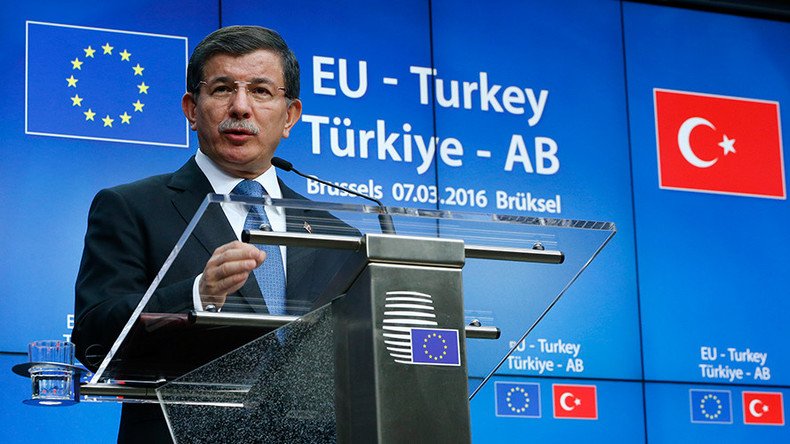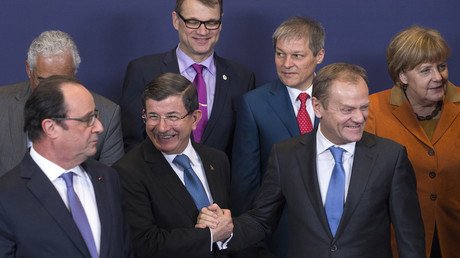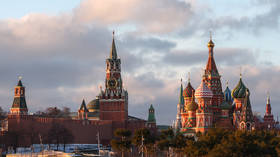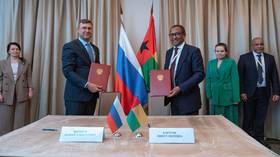'Extremely critical': Austria slams ‘breakthrough’ EU-Turkey refugee deal

Austria’s interior minister signaled its opposition towards a mooted but not yet finalized EU-Turkey refugee deal. The minister says she is “extremely critical” of the agreement, citing the situation with freedom of speech in Turkey.
"I am extremely critical. I am seriously wondering whether we are taking ourselves and our values seriously or if we are throwing them overboard," Johanna Mikl-Leitner told ORF public radio on Thursday.
The minister said it was beyond grasping how Ankara ended up at a negotiation table after Turkish forces stormed the headquarters of a daily newspaper Zaman.
"I think it's questionable if Turkey takes control of a newspaper critical of the government and then turns up here [in Brussels] three days later and puts a wish list on the table," she said.
Austria was not the only one slamming the EU-Turkey deal. German politicians, as well as several human rights groups opposed the proposed agreement.
Speaking with the Rheinische Post, Bavarian Interior Minister Joachim Herrmann said on Thursday “we should not make too many concessions to Turkey.”
Criticizing the prospect of visa-free travel for Turkish citizens, the Bavarian minister recalled the times when Germany abolished visa requirements for Balkan states in 2009. As a result, the amount of asylum applications from these countries "exploded," he said.
On Monday EU leaders and Turkey agreed on a “game-changing” plan in Brussels. Turkey promised to take one Syrian refugee from Greece per every Syrian refugee EU resettles from camps in Turkey. However, Ankara stressed that the agreement was not meant to be retroactive, and, therefore, would "not include the existing refugees on the Greek islands."
Turkey is now hosting about 2.7 million Syrian people who have fled the conflict across the border, AFP reports.
In return, Ankara asked for six billion euros ($6.6 billion) worth of funding from the bloc, a visa-free travel to Europe’s Schengen zone, and hinted its desire to join the EU. The deal is expected to be finalized on March 17-18 at the next EU summit in Brussels.
On Wednesday, several politicians from the Christian Social Union (CSU), the party chaired by Bavarian Prime Minister Horst Seehofer, criticized the EU for caving in to Turkish demands.
"The EU’s negotiating position has undoubtedly worsened over the past months because of the EU’s internal strife on the refugee crisis. The Turks were putting forward new demands and raised the price [of the deal] like at the bazaar,” the CSU’s secretary general, Andreas Scheuer, told Passauer Neue Presse newspaper. “CSU is against Turkey’s EU accession and against a full-scale visa-free regime for all Turks.”
Meanwhile, the UN refugee agency said the EU-Turkey “quick fix” deal would only encourage a fragmented flow of migrants which would try to find ways back into the EU, saying the agreement contravenes international law.
Speaking at a UN briefing on Tuesday, Vincent Cochetel, the UNHCR Europe Bureau Director, stressed that "collective expulsion of foreigners is prohibited under the European Convention on Human Rights. An agreement that would be tantamount to a blanket return of any foreigners to a third country is not consistent with European law, is not consistent with international law."
"EU and Turkish leaders have today sunk to a new low, effectively horse-trading away the rights and dignity of some of the world's most vulnerable people," Iverna McGowan, the head of Amnesty International office in Brussels, said in a statement on Tuesday.
The criticism comes as Balkan countries are set to seal their borders in a bid to stem the flow of migrants ahead of an EU ministers meeting on Thursday. Slovenia and Croatia have already closed their borders to most transiting refugees, while Serbia and Macedonia are expected to follow.
Greek PM Alexis Tsipras and Germany's Chancellor Angela Merkel both denounced the closures. While Tsipras said that the EU "has no future if it goes on like that", Merkel said the closures are "neither sustainable nor lasting" in tackling the migrant crisis.
Last week, Turkish police stormed the headquarters of the biggest opposition publication Zaman. The authorities accused the publication of having alleged links to the US-based Muslim cleric Fethullah Gulen, a former ally whom the government now accuses of attempting to topple the regime.
The decision by an Istanbul court to de facto censor the publication was granted after the request of the Istanbul Chief Public Prosecutor's Office, which accused the publication of taking orders from what it called the “Fethullahist Terrorist Organization/Parallel State Structure (FETO/PDY).”















